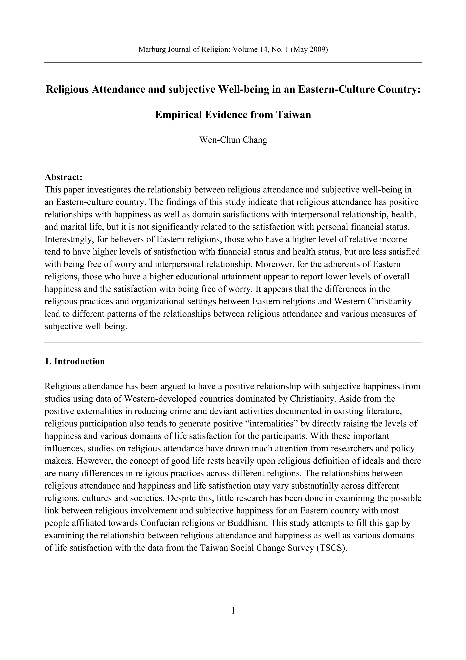Religious Attendance and subjective Well-being in an Eastern-Culture Country: Empirical Evidence from Taiwan
This paper investigates the relationship between religious attendance and subjective well-being in an Eastern-culture country. The findings of this study indicate that religious attendance has positive relationships with happiness as well as domain satisfactions with interpersonal relationship, heal...
Gespeichert in:
| 發表在: | Marburg Journal of Religion |
|---|---|
| 主要作者: | |
| 格式: | Artikel (Zeitschrift) |
| 語言: | 英语 |
| 出版: |
Philipps-Universität Marburg
2009
|
| 主題: | |
| 在線閱讀: | 在線閱讀 |
| 標簽: |
添加標簽
沒有標簽, 成為第一個標記此記錄!
|
| 總結: | This paper investigates the relationship between religious attendance and subjective well-being in an Eastern-culture country. The findings of this study indicate that religious attendance has positive relationships with happiness as well as domain satisfactions with interpersonal relationship, health, and marital life, but it is not significantly related to the satisfaction with personal financial status. Interestingly, for believers of Eastern religions, those who have a higher level of relative income tend to have higher levels of satisfaction with financial status and health status, but are less satisfied with being free of worry and interpersonal relationship. Moreover, for the adherents of Eastern religions, those who have a higher educational attainment appear to report lower levels of overall happiness and the satisfaction with being free of worry. It appears that the differences in the religious practices and organizational settings between Eastern religions and Western Christianity lead to different patterns of the relationships between religious attendance and various measures of subjective well-being. |
|---|---|
| DOI: | 10.17192/mjr.2009.14.3465 |
 Publikationsserver
Publikationsserver